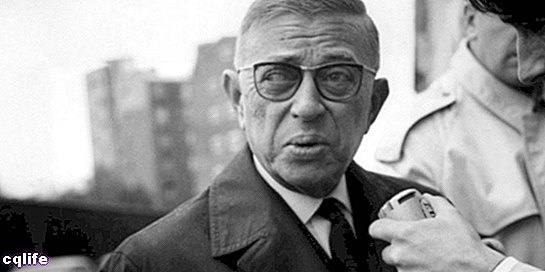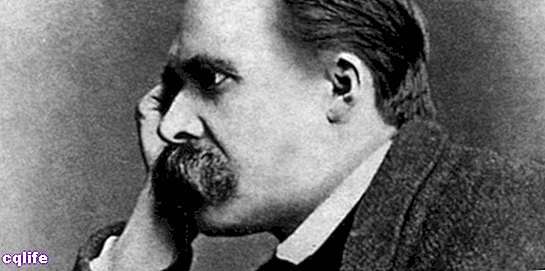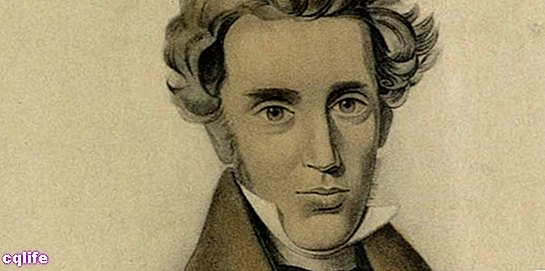- What is existentialism?
- Characteristics of existentialism
- History of existentialism
- Representatives of existentialism
- Christian existentialism
- Atheist existentialism
- Agnostic Existentialism
We explain what existentialism is, its history, characteristics and main authors. Also, its currents in relation to the divine.

What is existentialism?
Existentialism is a philosophical school that originated in the 19th century and lasted until the middle of the 20th century, as well as at literary movement begotten in it. His thinkers opposed the philosophy traditional since they considered that the starting point of the philosophical exercise should be the individual and their experiences subjective (phenomenological) of the world.
For existentialists, both moral thought and scientific are insufficient to understand the existence human. That is why new categories are needed, which they tried to build, and which are governed by a norm of authenticity. Both the Danish Søren Kierkegaard (1813-1855) and the German Friedrich Nietzsche (1844-1900) especially tried to lay the foundations for that existentialist philosophy to come.
However, there was never a general agreement regarding a strict definition of the term, and in many cases it is used to bring together the work of these philosophers from a posthumous, retrospective perspective. In other words, it was not a structured or homogeneous school of philosophy.
The main precepts of existentialism had to do with the fact that the existence of human being it precedes its essence (hence its name), that reality precedes thought and human will precedes intelligence. From this perspective, individuals are free and fully responsible for their actions, and they need a ethics alien to any system of beliefs external to responsibility individual.
Regarding its historical moment and its perspective on the subject of God, existentialism is usually classified into three different aspects, which we will see separately later: Christian existentialism, agnostic existentialism and atheistic existentialism.
Characteristics of existentialism
Broadly speaking, existentialism was characterized by the following:
- It was a not very homogeneous philosophical school of the mid-nineteenth and mid-twentieth centuries, whose members agreed more in their positions against the philosophical tradition, than in a single concept of what existentialism was.
- They did not trust any established belief system (such as religion) and thought that it was impossible to account for human existence through the combination of a moral and a scientific perspective only. So they tried to create subjective categories that would fill that void.
- Existentialism proposed a doctrine deeply individualistic: it was always about my existence or you existence, since the character of existence itself was the main puzzle to be solved by all philosophy.
- As a philosophical movement, existentialism was opposed to all forms of objectivism and scientism, and to any other doctrine that understood human beings as a reality complete that must be resolved into its elements to be known or contemplated. At the same time, he opposed any form of predestination, since he upheld the importance of human decision in the world; and to all forms of solipsism and epistemological idealism, since existence was considered as a transcendence of the to be. As will be seen, existentialism is easier to define from what it was opposed to.
- According to Sartre, existentialism was a form of humanism, since it insisted on the finiteness of human existence and its inherent ethical possibilities. In other words, it focused on the human individual and his subjectivity, first and foremost.
- In this way, existentialism encountered certain feelings of anguish, mourning, hopelessness, melancholy, the result of the contemplation of the finiteness and futility of human existence.
History of existentialism

Friedrich Nietzsche was one of the founders of existentialism.
The philosophy of existentialism had its beginnings in the 19th century. It began with the philosophical and essayistic work of Søren Kierkegaard and Friedrich Nietzsche, as well as the pessimism of the German Arthur Schopenhauer (1788-1860) and in the novels by the Russian Fyodor Dostoevsky (1821-1881).
These authors are usually considered antecedents of existentialism, since the school assumed its name in the twentieth century, especially after the traumatic events of the first and second World wars. Between the 1940s and 1950s the existentialists Jean Paul Sartre, Albert Camus and Simone de Beauvoir emerged in France. His works of fiction and academic texts, addressed topics such as the absurd, nothingness or the Liberty.
Thus, in the middle of the century they built a cutting movement nihilistic, which some understood as "the refusal to belong to any school of thought" and having "a marked dissatisfaction with traditional philosophy, which he labels as superficial, academic and remote from life", in the words of Walter Kaufman.
For many, the existentialism of the twentieth century was permeated with the feeling of moral defeat left by the WWII, especially the Nazi death camps and the two atomic bombs dropped on Japan by the United States.
The breakdown of modern promise and belief in scientific development found an important echo in existentialist positions, which insisted on the absurdity of human existence and stupidity.
Representatives of existentialism
The main representatives of existentialism were:
- Søren Kierkegaard (1813-1855). Danish philosopher and theologian, had along with Nietzsche as the fathers of existentialism, given his work focused on human existence, the individual, subjectivity, freedom, despair and anguish. Much of his work has to do with the Christian faith, which he harshly criticized. He is one of the main authors of contemporary thought.
- Friedrich Nietzsche (1844-1900). A German philosopher, poet, musician and philologist, he is considered one of the most important thinkers of Western contemporaneity, whose work deals with very different topics such as the art, the history, the tragedy, the religion, the science and other themes through which he built an important critique of the Western tradition of thought. He is known as one of the three "masters of suspicion" along with Marx and Freud.
- Martin Heidegger (1889-1976). German philosopher, one of the most important of the 20th century and of the contemporary western tradition, whose work was initially inscribed in the theology Catholic, to later dedicate himself to very diverse fields such as literary, social and political theory, esthetic, the architecture, psychoanalysis and environmentalism. One of his greatest works was Being and time, despite being incomplete. He is also accused of ideological affinity with Nazism, largely because Heidegger belonged to Hitler's party from 1933 to 1945.
- Jean-Paul Sartre (1905-1980). French philosopher, novelist, playwright and politician, he is one of the greatest exponents of existentialism and Marxism humanist. Nobel Prize Winner for Literature In 1964, which he rejected, and partner of the feminist philosopher and thinker Simone de Beauvoir, he developed a philosophical and literary work in which freedom and personal responsibility, as well as existential emptiness, occupied the central place.
- Simone de Beauvoir (1908-1986). French philosopher, writer and teacher, whose thinking was fundamental to the emergence of feminist doctrine, as well as women's rights and the decriminalization of abortion. It is part of existentialism and his work The second sex it is one of the most important of his career. She was the consort of Jean-Paul Sartre.
- Albert Camus (1913-1960). Algerian-born French philosopher, playwright, journalist and writer, he is considered an important exponent of existentialism, whose work was greatly influenced by Schopenhauer, Nietzsche and German existentialism.He was part of the French resistance during the German occupation in World War II and in 1957 he won the Nobel Prize for Literature.
Christian existentialism

The Christian side of this current tried to give an existentialist approach to Christianity, based mainly on the work of Kierkegaard. This school proposes that each person must make their decisions independently, since these then constitute their essence. It is your actions that will be evaluated before God, since that was the only way to keep constant scrutiny of your own actions.
Apart from Kierkegaard, the French philosophers and writers Gabriel Marcel (1889-1973), Emmanuel Mounier (1905-1950), Pierre Butang (1916-1998), as well as the German philosopher Karl Jaspers ( 1883-1969) and the Spanish philosopher and writer Miguel de Unamuno (1864-1936).
Atheist existentialism
Moving away from Kierkegaard's thought and Heidegger's philosophy, thus approaching rather an atheistic vision of the human being, this aspect is the work above all of Jean-Paul Sartre and his Being and Nothingness , as well as the works of Beauvoir and Camus, the latter to a lesser extent.
This form of existentialism denied any form of transcendental, metaphysical, or religious thought. In particular because the Sartrean formulation ("existence precedes essence"), was opposed to a tradition founded by Aristotle and inherited by Christianity. In this way, existentialism confronts the fear and anguish of the death, without offering any kind of final salvation at the hands of God, or of the nature.
Agnostic Existentialism
Associated more than anything with the work of Camus and his way of thinking, this third option suggests that the existence or non-existence of God and the divine is of very little relevance to the existence of the human being, since it may or may not exist, but This does not solve any ethical problem, nor does it offer any comfort to the human being who lives life as best he can.
